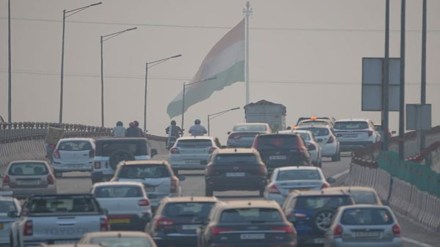After a few days of improvement, the Air Quality Index (AQI) in Delhi deteriorated once again and at 382, the AQI inched closer to a ‘severe’ level.
The air quality slipping into the ‘very poor’ category again has been attributed to a drop in wind speed which hinders the dispersion of pollutants in the air. An AQI between 0-50 is considered good, 51-100 is satisfactory, 101-200 is moderate, 201-300 is poor, 301-400 is very poor and 401-500 is severe.
The air quality index in the metropolitan city was reeling under the ‘severe plus’ category for 4-5 days in the past week and hence, all the schools were asked to go online.
Also Read: Delhi chokes with just 32% clean air funds being utilised, progress remains sluggish
Following slight improvement in the AQI levels over the past few days, the Commission for Air Quality Management (CAQM) in NCR and adjoining areas on Monday announced the relaxation of the GRAP norms currently applicable in all educational institutions.
The Directorate of Education (DoE) of the Delhi government issued directions to all schools in the national capital to follow CAQM’s order.
“State governments in the NCR shall ensure that all classes up to 12th Standard are conducted in a ‘hybrid” mode, i.e., both in “physical” and also in “online” modes, wherever online mode is feasible in the territorial jurisdiction of the NCT of Delhi and the districts of Gurugram, Faridabad, Ghaziabad, and Gautam Buddh Nagar in the NCR,” said the CAQM order.
Also Read: Schools, colleges in Delhi-NCR to reopen amid poor air quality? Here’s what Supreme Court said
This decision follows the Supreme Court’s order dated November 25 in the case of MC Mehta vs. Union of India, directing the CAQM to review GRAP restrictions in light of their impact on education. The court emphasised the need to prioritise education while raising several concerns, ANI reported.
